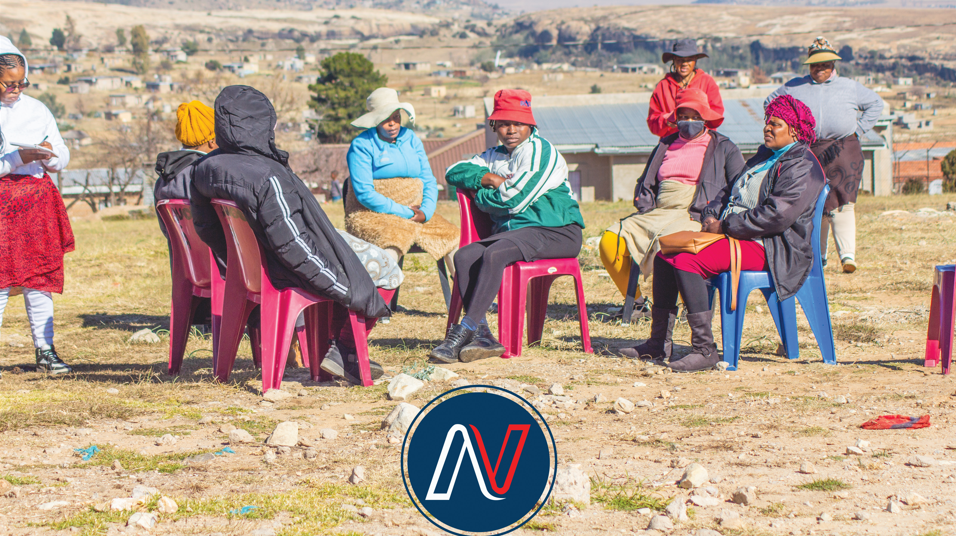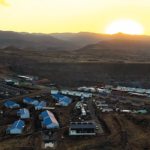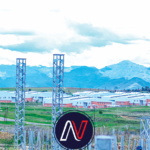- Residents say they were promised water but given excuses
- Officials preach patience as tank stays shut
Ntsoaki Motaung and Palesa Moloinyane
Tensions flared on Sunday as frustrated residents of Lekokoaneng in Berea attempted to take matters into their own hands, threatening to forcibly open a long-completed water tank that has remained inaccessible since its construction last year.
The water infrastructure, reportedly part of a M40 million project intended to address chronic water shortages in the area, has become a potent symbol of delayed service delivery.
Despite repeated efforts to engage authorities, community members said they have been sent from pillar to post with no clear explanations or timeline for when the water supply will be functional.
The project’s sod-turning ceremony was held in January 2024 and officiated by the Minister of Natural Resources, Mohlomi Moleko, who emphasised water as a fundamental human necessity. He reiterated Lesotho’s commitment to Sustainable Development Goal (SDG) 6, which aims to ensure availability and sustainable management of water and sanitation for all by 2030.
Yet, nearly a year after the infrastructure was reportedly completed in August 2024, and with promises of operational water access by December, residents are still without clean, running water.
In their latest attempt to seek answers, residents convened a community meeting on Sunday, inviting local chiefs, councillors, the District Administrator (DA), Members of Parliament (MPs), and officials from the Rural Water Supply (RWS).
None of the invitees attended, further enraging an already agitated community.
Some residents began calling for the tank to be forcibly opened. However, cooler heads prevailed after others warned that such actions would constitute trespassing and could lead to criminal charges.
Thuathe No. 26 MP, Voeswa Tsheka, told Newsday yesterday that she did not attend Sunday’s meeting because she usually receives invitations to community gatherings through the area chief or local councillor.
Tsheka said she received this particular invitation directly from the organisers, which prompted her to contact the councillor, who informed her that a separate meeting with the community was being planned for Thursday of this week.
“The meeting was originally scheduled for today,” she said on yesterday.
“However, it was postponed due to the cold weather. The challenge with weekend meetings is that government officials, who are directly involved in the project, often struggle to attend. These are the people best positioned to explain the technical details to the community.”
When asked why the water tank remains unused, Tsheka explained that although the tank was completed, it could not be put into operation due to the poor condition of the existing water delivery network, which is old and riddled with leaks.
“If the tank had been connected to the current system, most of the water would have been lost through leakages,” she said.
“It was therefore decided that the delivery network should first be upgraded. This decision was communicated to the community. The budget for the network rehabilitation has been approved, the work is underway, and once completed, water will be delivered. That day is not far off,” she added.
Speaking to Newsday by phone, Chief Souru Masopha acknowledged the community’s long-standing struggle with water shortages.
Masopha confirmed that the project was supposed to be completed by August 2024 and said he was informed by stakeholders that the delay is due to missing pipes and incomplete infrastructure needed to distribute the water.
He admitted he did not attend the meeting because he forgot the date and was not reminded by the organisers.
Local councillor Matobako Hlephole also failed to attend, telling Newsday that the gathering was held outside his electoral jurisdiction. Hlephole added that community meetings, especially on critical issues such as water, should be hosted at the local chief’s homestead, not elsewhere.
He said that while the contractor completed the tank in October 2024, his mandate did not include additional works like pipe installation. He noted that broken pipes from the old system had still not been repaired.
“There were delays in identifying a qualified person to manage the distribution network, and the original budget was exhausted,” he explained. “Repairs are now underway, and the contractor has committed to completing the remaining work by 17 July 2025,” he said.
Hlephole expressed disappointment that the community was not acknowledging the ongoing efforts. “They have been kept informed, yet they continue to demand immediate results,” he said.
The lack of water has deeply affected daily life in Lekokoaneng, with residents forced to fetch water from distant and often contaminated sources.
‘Mamonaheng Ntlhangoe, a woman in her 60s who uses crutches due to a health condition, explained the impossible choice she faces. “I live with my two grandchildren, aged 8 and 10. They are too young to fetch water at 3AM from a distant well. So, we are forced to use water from a dam, where animals also drink,” she said.
The water from the dam is used for all household needs, cooking, cleaning, and drinking, exposing the family to serious health risks.
Another resident, ‘Marelebohile Raletšele, echoed these concerns, emphasising the burden on women. “We wake up as early as 3AM to fetch water. We only return around 11AM,” she said. “These long hours rob us of time for rest, education, or income-generating activities.”
For schoolchildren, the water crisis has added a heavy burden. Parents and guardians at the meeting expressed concern that children must trek long distances to wells after school, often returning too late or too tired to focus on their homework.
The crisis extends beyond household needs. Local businesses, particularly brickmaking operations, have been brought to a standstill.
Thabang Noto, a resident, said: “Businesses that relied on water, especially those making bricks, have stopped operating. That means more joblessness and more poverty.”
‘Maitumeleng Tuoane, a community member leading the effort to demand accountability, shared what residents had learned from the Rural Water Supply.
According to Tuoane, officials explained that the tank remains non-operational because some essential pipes are missing, and there is no budget to procure them.
This explanation raised even more questions among the community. “Why was the project allowed to proceed with an insufficient budget, risking its completion and leaving us without access to water?” Tuoane asked.
She added that the situation is particularly dire for families who cannot afford to drill boreholes and are forced to buy water at M3 for 20 litres from those who have boreholes.
“Sometimes, we do not even have that M3 because we are unemployed,” she said. “Our only option then is to fetch water from a well where we share with animals,” highlighting the impossible choices residents are forced to make daily.
The community was especially alarmed by the alleged RWS’s claim of a lack of funds, given their understanding that the project was financed by the African Development Bank.
Residents also recalled that before the current tank was built, there was a functioning tank in place. They used to contribute M20 monthly for electricity to pump water into a communal tank that met their needs. However, that system was dismantled when the new project began, without any warning or consultation, they said.
“We had no problems with that tank until it was demolished,” one resident said. “We were simply told a new one would soon replace it and distribute water. But here we are, still waiting.”
The dismantling of a working system in favour of one that remains unusable has only deepened feelings of betrayal and abandonment among the people of Lekokoaneng.
Summary
- Tsheka said she received this particular invitation directly from the organisers, which prompted her to contact the councillor, who informed her that a separate meeting with the community was being planned for Thursday of this week.
- When asked why the water tank remains unused, Tsheka explained that although the tank was completed, it could not be put into operation due to the poor condition of the existing water delivery network, which is old and riddled with leaks.
- Masopha confirmed that the project was supposed to be completed by August 2024 and said he was informed by stakeholders that the delay is due to missing pipes and incomplete infrastructure needed to distribute the water.

Your Trusted Source for News and Insights in Lesotho!
At Newsday Media, we are passionate about delivering accurate, timely, and engaging news and multimedia content to our diverse audience. Founded with the vision of revolutionizing the media landscape in Lesotho, we have grown into a leading hybrid media company that blends traditional journalism with innovative digital platforms.









